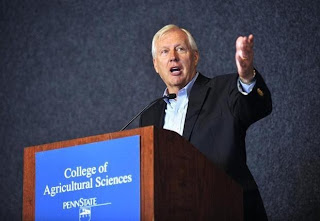ROCK SPRINGS — Penn State administrators in Old Main and on Ag Hill were elated months ago that the state was proposing flat funding for the university’s agricultural research and extension line items.
They were hopeful for extra money, but in tough economic times, they weren’t going to count their chickens before they hatch.
As it turns out, a state budget passed that would give the College of Agricultural Sciences $1.5 million more than administrators originally anticipated for the 2013-2014 fiscal year.
On Wednesday, at the university’s and college’s annual Ag Progress Days, administrators gave public thank-yous to state officials and groups who support agriculture during the annual government and industry lunch. It’s an event that brought together nearly 700 attendees consisting of agri-businessmen and women and municipal, county and state officials.
“There is too little public recognition of how much we all depend upon farms as stewards of our soil, water and wildlife resources,” Penn State President Rodney Erickson told the crowd, quoting the late John F. Kennedy. “We’re working to change that. Special thanks go to our agricultural advocates, who have made it their mission to preserve and protect Pennsylvania’s agricultural heritage and future.”
Ag Progress Days gives Penn State the chance to show off its contributions and achievements to agriculture. The events will wrap up Thursday.
Wednesday’s invitation-only lunch had a slew of local figureheads who ate the buffet lunch, such as state lawmakers Jake Corman, Kerry Benninghoff and Scott Conklin, and Penn State agricultural trustees Keith Masser and Carl Shaffer.
During his speech, Erickson rattled off a list of accomplishments in the College of Agricultural Sciences, such as its being ranked No. 9 worldwide in the fields of agriculture and forestry and a $10 million federal grant received last fall for research into growing energy crops on marginal and abandoned land.
He mentioned student achievements, too: Students took first place in a national competition for their creation of a quiche-like dairy product they dubbed a “ moofin.” And he said Penn State can boast that its alumni are the superintendents at the golf courses that hosted this year’s Master’s, U.S. Open and PGA Championship, the three premier golf tournaments.
Erickson, who said he was born into farming, will return to farming when he retires next year.
Benninghoff, a representative from Bellefonte, said after the lunch that it was beneficial to hear how funding is used for education and research in agriculture. It’s ultimately taxpayer money that the legislature distributes, he said.
“It’s nice to be able to bring the bacon back home, as they used to say,” he said. “It just comes full circle, and I’m glad to see that.”
U.S. Rep. Glenn Thompson, R-Howard Township, stressed to the crowd the continued importance of agriculture when it comes to national security.
“The threat to national security is when we would have to rely on another country for our food supply,” he said. “You keep that from happening. You feed the nation and you feed a lot of the rest of the world.”
He also got a laugh out of the crowd, using a play on words, when he made fun of himself saying that he was given 15 minutes to make remarks.
“With that much fertilizer, I’d burn crops off at the roots,” he said.
Later Wednesday, Thompson was more serious when he and state agriculture Secretary George Greig fielded questions from the public.
When asked about immigration and farm workforces, Thompson said farmers and ranchers need properly trained workers.
“We cannot get Americans to do those jobs. That is the reality of farming,” he said. “If we can’t get a trained workforce, then we can’t feed ourselves.”
One man asked about the status of farmland preservation, and Greig said the state has 475,000 acres that are preserved. It’s tough, he said, as Pennsylvania’s close proximity to population centers in the Northeast puts pressure on the state’s farmland.
Thompson also said farmers throughout the Chesapeake Bay watershed region have worked to keep their cattle out of streams, out of concerns that the cows contribute to polluting the waters. One woman disagreed that the problem had gone away, and Thompson said work needs to be done.
The hourlong session will air soon on PCN, but a specific time and date wasn’t immediately available.
Penn State is budgeted to get $46.2 million from the state this fiscal year, an increase of 3.4 percent over last year.
Barbara Christ, the college’s interim dean, has said that money will mostly help maintain programs and minimize downsizing. The college will create three research centers using $300,000 from the bump in state funding, and information about the centers will be presented Thursday at Ag Progress Days, Christ said.
In addition, Christ said the college has restructured its extension programs in a way that is more collaborative and team-oriented than in the past.
For instance, she said, an expert in dairy nutrition who works at the Lancaster County Cooperative Extension office would be synced up with other extension workers across the state who have expertise in the dairy field.
The college continues to operate an extension office in all 67 counties, but the college’s vision would essentially remove the county boundaries so that people who use the extension services can access help across the state, she said.
Original Article Here


No comments:
Post a Comment